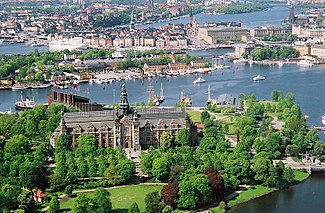Djurgården
| Djurgården | |
|---|---|

The Nordic Museum at Djurgården, facing south-west with Skeppsholmen, Gamla stan and Södermalm in the background
|
|
| Location | Djurgården, , Sweden |
Djurgården (Swedish pronunciation: [ˈjʉːɡɔɳ], [ˈjʉːrɡɔɳ] or [²jʉːrˌɡoːɖɛn]) or, more officially, Kungliga Djurgården (Swedish: The (Royal) Game Park) is an island in central . Djurgården is home to historical buildings and monuments, museums, galleries, the amusement park Gröna Lund, the open-air museum Skansen, the small residential area Djurgårdsstaden, yacht harbours, and extensive stretches of forest and meadows. It is one of the Stockholmers' favorite recreation areas and tourist destinations alike, attracting over 10 million visitors per year, of which some 5 million come to visit the museums and amusement park. The island belongs to the National City park founded in 1995. Since the 15th century the Swedish monarch has owned or held the right of disposition of Royal Djurgården. Today, this right is exercised by the Royal Djurgården Administration which is a part of the Royal Court of Sweden.
A larger area of the city, separated from Djurgården proper by Djurgårdsbrunnsviken is Norra Djurgården (Northern Djurgården), including Gärdet.
Djurgården was until the 16th century known as Valmundsö (spelled Walmunzø (1286), Walmundzø (1288), Walmanzö (1349), Wadhmundzøø (1432), Wadhmalsø (1437), Wadmalsö (1444), Walmundzön (1452), Walmasöön (1511), Walmarsöö (1516), Wallmarsön, Waldemarksön (17th century)) and this name is still preserved in locations such as Waldemarsudde. Though several proposals to explain this name have been put forward, no authoritative explanation is generally accepted. While the name of King Valdemar (1239–1302) was probably associated with the old name during the 17th century, the separate elements of the original variations of the name might be interpreted as etymologically related to either Walm-und-ö - if walm is linked to the Anglo-Saxon words wielm, wylm, this would mean the original name should be interpreted as "The island outside of which the waves grow large" (an interpretation with no equivalents in other Nordic geographic names) - or Wal-mund-ö - which could possibly be interpreted as walder ("embankment", "grounds") and mun ("mouth"), i.e. "the grounds next to the mouth of Lake Mälaren".
...
Wikipedia
